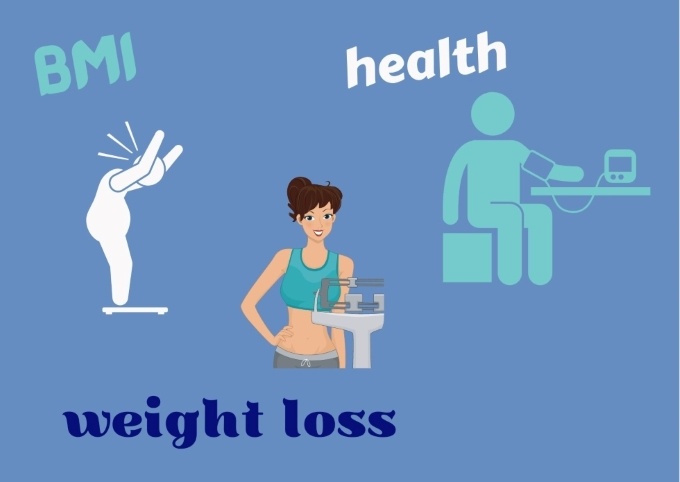What is BMI?
BMI or body mass index is a universally used calculation to determine your fat ratio using your height and weight. This calculation was first introduced somewhere between the 1830-1850’s by a Belgium astronomer.
However, it wasn’t used until Ancel Keys printed the phrase in a 1972 edition of the Journal of Chronic Diseases. This body mass index is one assessment that is used to determine if you are at a healthy weight. It’s merely a screening tool and just one factor used in determining weight issues. BMI does not show someone’s overall health.
BMI is an easy-to-use screening tool that helps your doctor put you into a weight category. Many medical professionals use this measurement, but is not a diagnostic tool. Your doctor will probably also use other assessments to determine your overall health.
How is BMI Calculated
I’m not a math whiz, nor a medical professional, but I’ll try to explain this in a way to be understandable. The metric BMI, as it was first presented, is weight (kg) / [height (m)]2.
However, I live in the US, and we would use weight in pounds x 703 divided by height squared (in inches). But of course, you can always use a BMI calculator which is soooo much easier. I have one that you can use in my sidebar to the right.
What Does BMI Have To Do With Our Health?
BMI is a general tool used by doctors to see if someone is underweight, normal, overweight, obese or morbidly obese. It is a good starting point to see where someone falls into these categories. Here is the breakdown of weight categories according to the World Health Organization:
Underweight: Less than 18.5 BMI
Normal: Between 18.5 and 25 BMI
Overweight: Between 25 and 30 BMI
Obese: Between 30 and 35 BMI
Morbidly Obese: Over 35 BMI

Factors That Can Affect Your BMI
While BMI is a good starting point in your health assessment, your doctor will take other factors into consideration. For instance, muscle is denser than fat and therefore weighs more. People like weight trainers or athletes, could be at a very healthy weight but their BMI falls into the obese category.
Genetics, fat distribution, activity level and your age can play a big factor in your overall health determination as does ethnicity. An example would be those of Asian origin. Many Asians can have high-risk health concerns like diabetes with a BMI of only 23.
And as we age, most of us lose muscle mass which would affect a BMI reading. Someone could appear to have a good BMI reading, but in truth, doesn’t.
There is also a difference in variables to take into consideration between women and men. Most of us know women carry more fat on our bodies while men carry more muscle. Because muscle weighs more, BMI can be thrown off a bit, just like explained earlier about athletes.
These are all reasons why BMI should be just one variable used by your doctor to determine your overall health. Other variables used are diet, exercise patterns, family history and body fat measurements.
Is BMI Accurate?
There is some debate about BMI and its use and accuracy. As discussed in the previous paragraphs, there are variables that BMI can not take into consideration when being calculated. Age, gender and muscle mass could all affect the accuracy of a BMI rating. When this is the case, other ways are used to measure someone’s health.
For example, your doctor may also take your waist measurement. Many medical professionals believe that a bigger waist circumference links to an increased risk of heart disease, Type 2 diabetes, abnormal cholesterol levels, and high blood pressure. The waist measurements used are — generally larger than 35 inches for women and 40 inches for men.
This measurement may also be used to determine obesity. BMI doesn’t necessarily take into consideration where fat is located on our body. It’s generally thought that excess weight gain around the hips and backside to be less worrisome than too much fat around the abdominal region. Fat in the stomach region of the body could lead to an increased risk of obesity-related health complications.
General Health is Personal To Each Individual
Our general health is only relative to each individual. I’m an example of this. At 5’2”, I’m on the shorter side and because of this, I always came in as overweight according to my BMI, even though I may have weighed between 130-150 at any given time.
However, other health markers such as my heart, was fine, cholesterol was normal, so was my blood pressure and blood sugar. I tended to be on the curvy side, but muscular as I was a runner. I had nothing wrong with me, but my BMI may have said otherwise. My doctor felt I was in pretty good shape.
People with a lower BMI can be unhealthy and vice versa is true. People with a BMI on the higher side can be perfectly healthy. My doctor put the emphasis on my overall health, rather than just my BMI.
Then life got in the way, and I quit running and exercising and lost the muscle. And as I got older, my BMI kept going up. That’s when my doctor started raising his eyebrows and I started feeling crappy a lot of the time.
So, the general rule of thumb of BMI classifying you as overweight or obese and therefore, unhealthy, really started applying to me. Eventually, I decided on bariatric surgery to get me in a good place again.

What BMI Ranking Qualifies For Weight Loss Surgery
Weight loss surgery or bariatric surgery has been an effective method for fighting obesity for me. My doctor and insurance company considered that morbid obesity falls within a BMI of 35 – 39.9. Unfortunately, this level of being overweight can cause conditions such as Type 2 diabetes, osteoarthritis, obstructive sleep apnea, and high blood pressure.
To be a candidate for weight loss surgery, both your doctor and insurance company may use the following criteria:
–You have a BMI of over 35 and are experiencing a range of adverse health complications, such as diabetes or high blood pressure
–You’re unable to maintain a healthy body weight for any period of time, even under a medically supervised dieting plan
–You are more than 100 lbs. heavier than your ideal body weight
–You have a Body Mass Index (BMI) of over 40
Final Thoughts on BMI
Physicians use BMI as a diagnostic tool in combination with other types of health tests. This makes it an effective method of determining weight categories and identifying possible health risks.
It doesn’t matter if you are on a weight loss journey like me or just trying to be more mindful of your health, A smaller waistline or losing a small amount of weight, can have a huge improvement on your blood pressure, blood sugar and cholesterol levels. Just losing as little as 5 – 10% of body weight can contribute to these improvements.
If you’re seriously considering bariatric surgery, or if you’ve already undergone surgery, just realize that lifestyle changes will definitely need to be made in order to keep unhealthy levels of body fat at bay.
The best way to get started on your weight loss surgery journey is to make that first phone call to a doctor. Then contact your insurance company to find out their criteria for the surgery.
Please take a moment to share this post! You never know who could be silently struggling with weight issues and want to know more about bariatric surgery.
Stay Awesome!
Cher
References:
NIH — https://www.nhlbi.nih.gov/health/educational/lose_wt/BMI/bmicalc.htm
WebMD — https://www.webmd.com/men/weight-loss-bmi
CDC — https://www.cdc.gov/healthyweight/assessing/bmi/index.html
Relevant Reading:











Thanks for the information Cher. I needed a kick in the britches to get off my duff and lose some weight. Cheers, Kate
Hiya Katie:
Glad to be some help! Did you take the time to use the BMI calculator? I’m curious!!
Cher